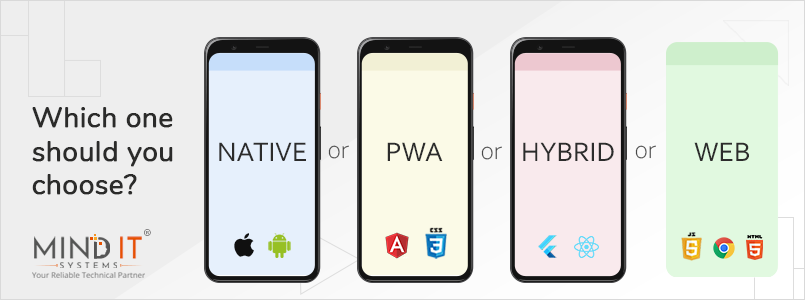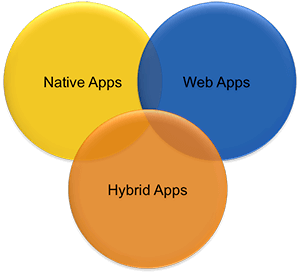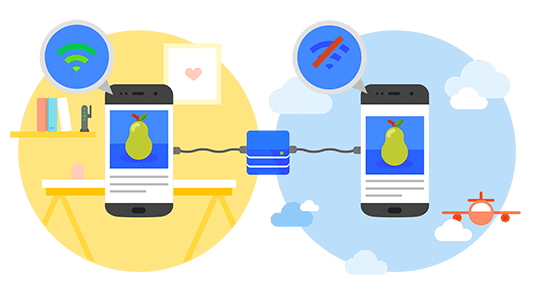
Native, Hybrid, Web or Progressive Apps- Which mobile app to choose?
In the past few years, mobile devices have evolved from being just a means of communication to a highly important business tool. As technology is getting advanced at lightning speed each day, people are also getting addicted to their smartphones and other mobile devices.
Mobile applications have made it easier for customers to get business information and helping them in keeping connected with their favourite brands. Mobile apps are an important means of marketing for businesses to expand their reach and increase the brand exposure. Check out list of important key points to help you create a successful mobile app for your business – Points to consider when planning to build your business app
Mobile applications and their categories
As it’s clear how important mobile applications are in today’s business, let’s move deeper into the world of mobile applications. In general, mobile applications are divided into four categories – Native, Hybrid, Web, and Progressive Web apps, each one of them serving their own purpose. Reading further shall help you in understanding each one of these.
Native apps
Native mobile apps are exclusively developed for a specific type of operating system (OS) like Android, iOS, or Windows. They are called native because they are native to a particular platform or OS. Applications based on one sort of operating system can’t be utilized on another OS. For example, Android apps cannot be installed on the iPhone. Native apps use development tools and language that the respective platform supports, like Android uses Eclipse and Java. Natively building applications can help developers tofully access all device controls like contacts, camera, sensors, etc.

With native apps, high performance and great user experience can be expected as the developers developing these apps use the native device UI.
Advantages of native apps
- Native apps are generally faster and reliable in terms of performance.
- Native apps are more interactive and intuitive, and aligned to what a user expects from a specific platform / OS.
- Native apps integrate better with mobile hardware.
Disadvantages of native apps
- Native app developers have to code for one platform at a time, separate coding for Android and iOS.
- Native apps can be tedious to develop and even hard to maintain as the platforms evolve.
- Native apps can be expensive as they are built specific to platform, and therefore this means more money if an application needs to be available on multiple platforms /OS.
Hybrid apps
Hybrid apps are a type of apps that can be categorised as being built for multiple platform /OS while taking advantage of various device features available.
Hybrid apps are developed using HTML, CSS, JQuery, Javascript, react, ionic, ext JS technologies, etc. These apps, just like Native apps, are installed on the device and distributed through the app store. Hybrid applications are best for building applications that can work with common UI experience across OS .

Advantages of hybrid apps
- Hybrid apps use a single code base for all platforms; thus, it ensures smooth updates and cost-effective maintenance.
- Hybrid apps are relatively easier and faster to develop.
Disadvantages of hybrid apps
- Hybrid apps can be less interactive than native apps. Generally any interactions become available in OS first and and then on hybrid development frameworks.
- Sometimes there could be unique issues while accessing hardware of mobile in case of hybrid apps as they use a single code base for all platforms.
Web apps
Web apps can be accessed via a web browser on your mobile device. They are not standalone apps that can be downloaded and installed on your device. Actually, they are responsive websites that adapt their user interface to the device the user is on. So, when you come across the option to ‘install’ a web app it often simply bookmarks the website URL on your device.
Web apps generally use HTML5, CSS, Javascript, JQuery, Ruby, and similar web technologies that are used for web work. These apps cannot access the features of native device functionality.
Advantages of web apps
- Web apps are accessible across a range of devices, users just need to have internet access.
- Web apps don’t need to be customized to a platform or OS. This brings down the development cost of these apps.
- Web apps don’t take up space on your device memory like a native app.
Disadvantages of web apps
- Web apps totally depend on the internet speed and the browser used on the device. Functionalities within different browsers may vary, giving users a varying experience.
- Web apps have some access restrictions to certain hardware features of the device it is running on.
- Not truly mobile apps. At best, they are better than having no mobile specific experience for end use.
- The interface of web apps can seem less sophisticatedis not that sophisticated.
Progressive web apps
Progressive web apps are like regular web pages but provide additional user functionalities like working offline, push notifications, and device hardware access. The best thing about progressive web apps is that they can be accessed via the app icon on the device’s home screen as soon as they are clicked, and this leads to the app website.

Progressive web apps act just like native or hybrid apps; automatically get updated, and are served through HTTPS, to maintain security.
Advantages of progressive web apps
- Progressive web apps work on every supported browser, every time on every phone.
- Progressive web apps can function in low-quality internet connections & can be used even when offline.
- Development of progressive web apps is easier and faster, and even less expensive.
- Downloading of a progressive web app is incredibly fast as they can be smaller compared to native apps.
Disadvantages of progressive web apps
- Progressive web apps have limited access to certain device features like Bluetooth, proximity sensors, advanced camera controls, geofencing etc.
- Progressive web apps can face challenges in fetching data from other apps like Facebook, Google Apps etc.. and support of the default browsers of some of the manufacturers.
Applications recommended based on the following parameters
| MOBILE APPS | NATIVE | HYBRID | WEB |
|---|---|---|---|
| Performance | These apps offer the most robust performance and deliver a rich user experience to native device users. | These apps also demonstrate good performace. | These apps perform poor performance compared to native and hybrid apps. |
| Development Effort | It takes more time to develop native apps. | Faster to develop. | Takes less time compared to Native and Hybrid apps. |
| Development Cost | Usually higher than web and hybrid apps if developed for multiple platforms.l | Requires high skills for hybrid tools. | Could be on the low side. |
| Maintenance | Maintenance of these apps is higher when developed for multiple platforms. | As there is the only codebase to be maintained or updated maintenance of these apps is easier and fast. | |
| Budget/Monetization | Both of these apps may contain in-app purchases, ads, and app purchases. App stores also take a fee for the purchase of actions, and an initial fee is also needed to deploy these apps in the app store. | Usually via advertisements or subscriptions. | |
| Examples | Whatsapp, Facebook, Gmail, Twitter | Instagram, Wikipedia, Yelp, Uber, and Amazon Store | These types of apps include online forms, shopping carts, word processors, spreadsheets, Yahoo, AQL, etc. |
Choose the mobile app that’s best for You
Finally here are some factors which will influence your decision to decide which mobile app is right for you.
- You decide to have an app ASAP – If you need an application on an urgent basis without complex functionality – in the shortest time possible, then you cango for web applications. These apps take less time to be developed and cost lower compared to native and hybrid app.
- You decide to have an app with access to limited hardware resources – If you want to go the unified experience way, then you need to better opt for hybrid app.
- You decide to have a robust app that is fast, smooth and give platform specific experience – If performance is of the utmost importance along with native experience, then there’s no way around it: you need to develop a native app. This gives you the speed, stability, and control on customizations to the nth level.
Choosing a mobile application that you wish to build is not a one-and-done decision. You can always choose to build another type of mobile application down the road, as per your user’s needs. However, once you have built a mobile application, make sure that you monitor the metrics that matter for the actual growth of your brand.
Willing to transform your awesome idea into reality with your mobile app – Let’s talk
Did you check out list of important key points to help you create a successful mobile app for your business?
Share this post
About the Author

Sujoy Roy
(Head – Digital Marketing )
From my teenage time, I had a quench to solve problems and loved leadership. Starting my career in relation management, ignited my passion for managing people. While managing I realized technology needs to be incorporated to keep pace with the changing world & do my work efficiently.

